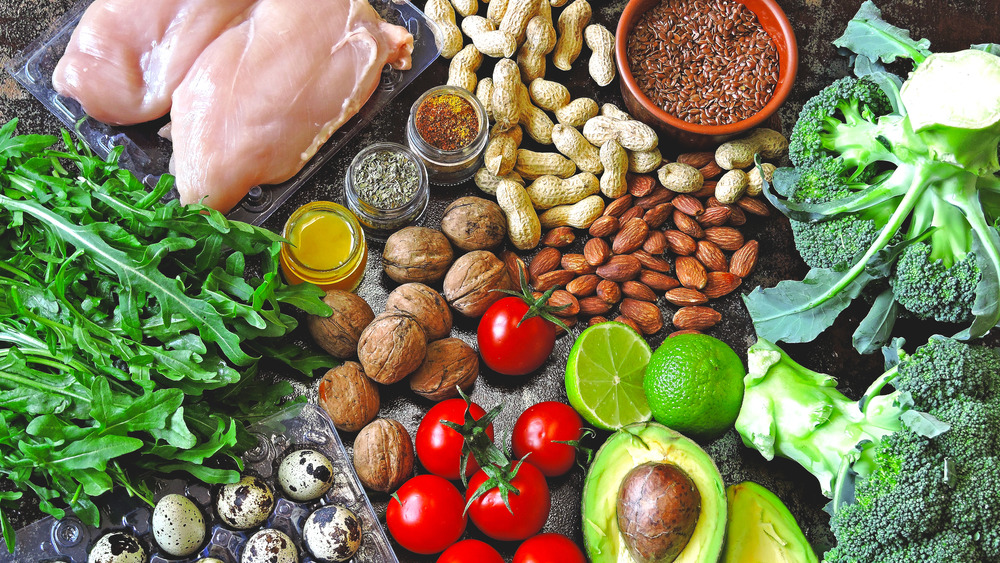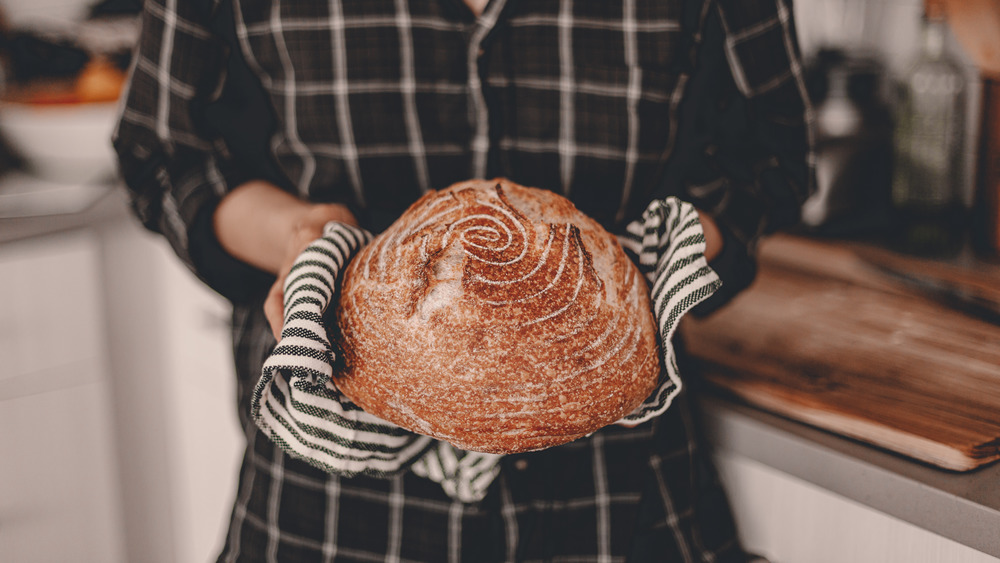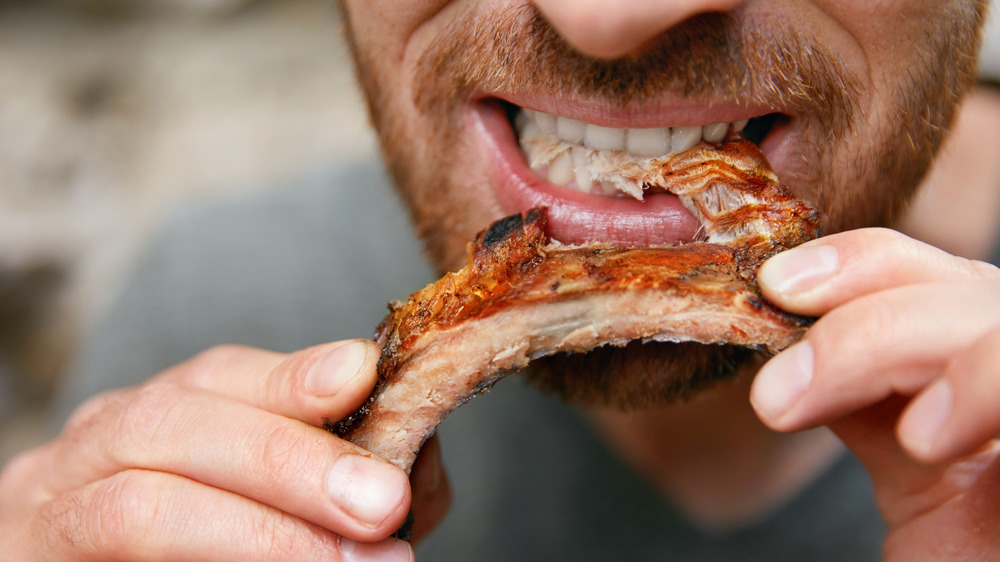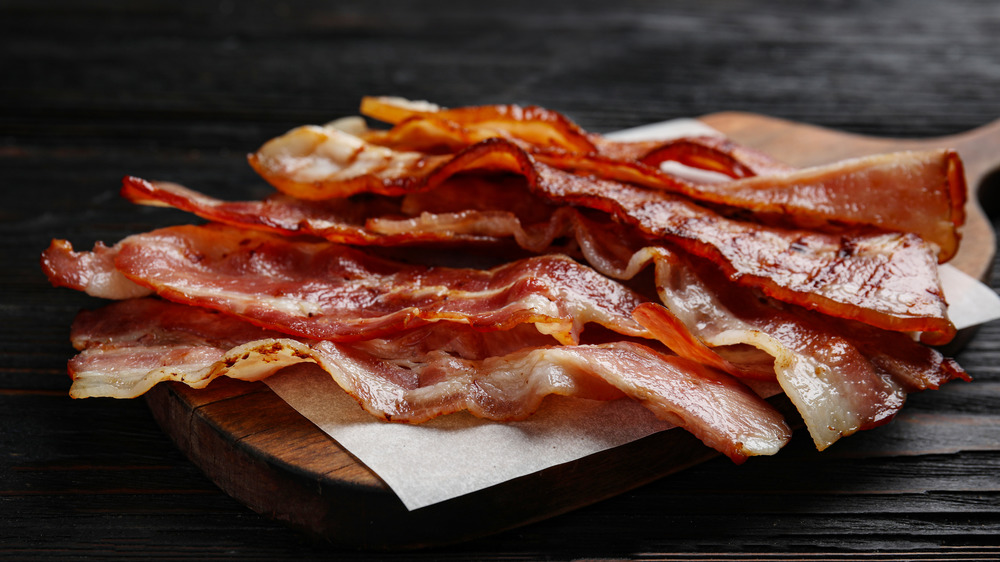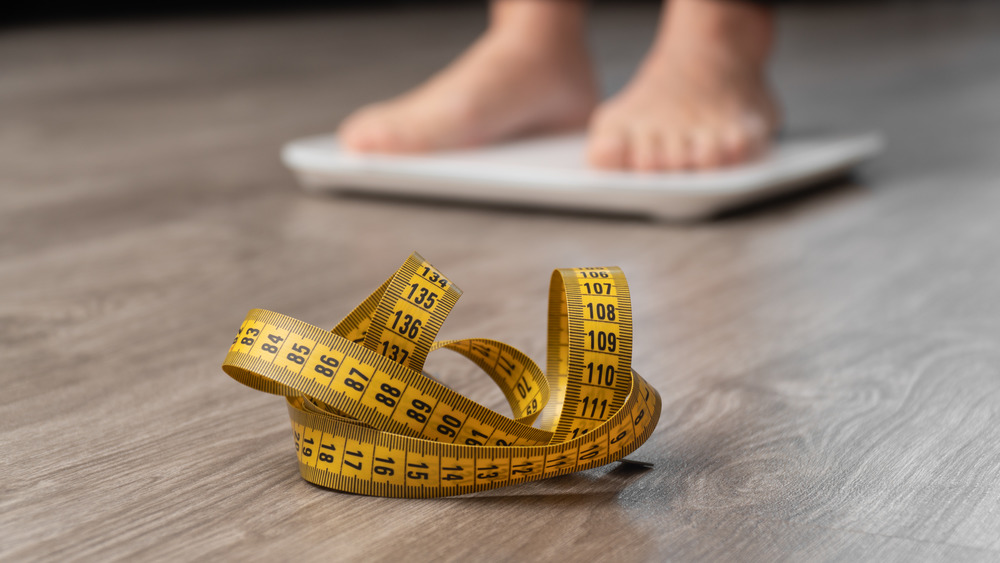The Big Mistakes Everyone Makes On The Keto Diet
The ketogenic, or keto, diet is a high-fat, moderate-protein, low-carb eating plan. It has been around for at least a century and was first used to treat epilepsy in children. However, it has since been scientifically proven to support the reversal of a number of serious metabolic issues, including obesity, insulin resistance, and hypertension, according to Dr. Massimiliano Caprio, endocrinologist and author of a 2020 research paper published in the Journal of Translational Medicine, which reviewed the benefits of the keto diet. Improvement of these issues can, likewise, reduce your risk of cardiovascular disease.
On the other hand, success on the keto diet requires strict adherence to a very specific macronutrient formula, comprised of 55 to 60 percent fat, 30 to 35 percent protein, and 5 to 10 percent carbohydrates. With little to no room for error, the keto diet can be extremely challenging, presenting many opportunities for missteps. Fortunately, success is still within reach. It's just a matter of avoiding some mistakes that everyone tends to make on the keto diet.
One of the biggest mistakes you can make on the keto diet is not following it to the letter
If followed to the T, the keto diet causes the body to enter into a metabolic process known as ketosis, in which fat (as opposed to carbs) is metabolized, according to Dr. Massimiliano Caprio, endocrinologist and author of a 2020 research paper about the keto diet. In ketosis, the body manufactures ketone bodies, which support both rapid weight loss and a reduction in chronic inflammation, Dr. Caprio told Health Digest.
However, if you throw off the formula by eating too much of one thing, like fat or protein, the body is left in a difficult position. It may have to digest an enormous amount of such foods, but without the benefits that come with manufacturing ketone bodies. In other words, you can end up eating a lot of fat or protein for no good reason. This may not only interfere with weight loss, but it can even lead to weight gain. It also poses serious health risks (including cardiovascular disease and certain cancers), particularly if your approach to keto is to "emphasize saturated fats and animal proteins," Jeremy Furtado, a senior research science in nutrition at Harvard's T.H. Chan School of Public Health, told Market Watch.
People often mistake keto for an easy diet
Since the keto diet is known to be rapidly effective for weight loss and improving metabolic health, it can be tempting to dive right in without thinking through whether following it is actually feasible for you, given your food preferences and your lifestyle. This is a big mistake because following the keto diet to the letter, in most cases, requires abandoning a style of eating to which you have been accustomed your whole life, Randall Stafford, professor of medicine at the Stanford School of Medicine, explained in an article for Scope.
The typical American diet, according to a 2019 study published in the Journal of the American Medical Association, is comprised of nearly 50.5 percent carbohydrates, of which around 21.2 percent come from refined grains, fruit juices, and potatoes, and foods, and around 14.4 percent come from foods and drinks containing added sugars. By contrast, achieving ketosis, which is at the heart of the keto diet, requires that you limit carbohydrates to a mere 5 to 10 percent of total calories. So do consider carefully whether you are up for such a major change.
It's a mistake to ignore calories while on the keto diet
The keto diet is not about restricting calories. Rather, it is about attaining and maintaining the metabolic process known as ketosis. This process causes the body to manufacture and circulate ketone bodies, which supports rapid weight loss and a rapid reduction in chronic inflammation, endocrinologist Dr. Massimiliano Caprio told Health Digest. However, attaining and maintaining ketosis requires consuming the right proportions of macronutrients, and those proportions are based on your total daily caloric intake.
Therefore, before you can even get to calculating how much of each macronutrient to aim for on a daily basis, you must determine how many calories you plan to consume. While scientifically accepted estimates are helpful in coming to a ballpark figure, they are not precise enough for the keto diet because other factors come into play, including your level of physical activity. To calculate how many calories you should be eating per day — and, in turn, the specific amount of macronutrients that you need to be eating — you should check with a nutritionist or your doctor, or you can use a credible caloric-needs calculator.
Not limiting your carb intake is a huge mistake
Attaining and maintaining ketosis is the heart of the keto diet, but that's impossible if you eat too many carbs, and that goes for even "healthy carbs." Limiting carb intake is much harder than most people realize, Randall Stafford, professor of medicine at the Stanford School of Medicine, explained in an article for Scope. Restricting carb intake often comes with side effects, including headache, muscle cramping, and constipation. Yet those side effects may kick in long before you have reduced your carb intake enough to support ketosis.
"Sometimes, a person may feel as though they have drastically reduced their carb intake. However, they may still be eating enough carbs for the body to produce energy from glucose, and this will prevent the body from burning fat," according to Medical News Today. To avoid this, it is important to keep track of everything you consume, and all related nutritional values. That requires carefully reading nutrition labels and then making certain to measure out precise portions. Some people who have had success on the keto diet recommend using a food scale for optimal precision.
Eating too much protein can undermine your efforts on the keto diet
It may be tempting to load up on protein when you're attempting to lose weight, especially given that increased protein intake has been scientifically proven to support feelings of satiety, increased metabolic speed, and the maintenance of a healthy bone mass, among other things. However, it is important to put such notions aside when you're following the keto diet because attaining and maintaining ketosis is impossible if you eat too much protein.
Too much protein is anything over 30 to 35 percent of your daily caloric intake. When you consume protein in excess of that percentage, the body will take the opportunity to break down the excess proteins into amino acids, which then get converted into glucose in a process known as gluconeogenesis. This would be a huge mistake because it is precisely the opposite of your goal when you follow the keto diet.
It's a big mistake to consume the wrong kinds of fats on the keto diet
Consuming the right amount of dietary fat is critical to attaining and maintaining ketosis. That means consuming between 55 and 60 percent of your calories in the form of fat. However, keto's "license" to consume a high-fat diet does not translate to a license to consume a diet high in unhealthy fats, registered dietitian Trista Best told Health Digest. Saturated fats, such as those from red meat, are notoriously unhealthy because they are associated with increased risk of metabolic and cardiovascular disease. Likewise, limiting saturated fat intake is associated with a reduced risk of cardiovascular disease, a 2015 study found.
Consuming monounsaturated and polyunsaturated fats are also associated with a reduced risk of these diseases. That being said, polyunsaturated fats that are high in Omega-6 fatty acids (e.g. vegetable oils) may increase your risk of these diseases by increasing inflammation. That effect may be counteracted by consuming these fats along with foods rich in Omega-3 fatty acids (e.g. avocados), according to Harvard Heart Letter. That is why optimal health benefits from keto require careful selection of fats, Best told Health Digest.
The keto flu is real, and it's a mistake not to prepare for it
Before you begin the keto diet, it is important to be prepared for feeling pretty lousy during the first two weeks or so, according to registered dietitian Melissa Mitri. This phenomenon is popularly known as "keto flu" (despite that it is entirely unrelated and separate from actual influenza). Symptoms of the keto flu include headaches, brain fog, fatigue, nausea, difficulty sleeping, and more. Not everyone who gets the keto flu experiences all these symptoms, and not everyone on the keto diet will experience the keto flu.
According to Harvard Health Blog, the precise reason for keto flu is unknown, although it may have to do with changes in the gut microbiome or even simple carb withdrawal. According to Mitri, it may have something to do with sodium and fluids rapidly exiting the body in response to a diet very low in carbohydrates. If you do come down with symptoms of keto flu, it may help to increase fluid intake.
It's a mistake to think you won't plateau on the keto diet
If you mentally prepare yourself for the keto flu and forge your way through it by sticking to your plan and drinking plenty of water, you may be delighted to see that you've lost a lot of weight in a relatively short time. However, you will also need to prepare yourself for the fact that it may not necessarily be all fat that you're losing. In fact, at least at the outset of your keto journey, your weight loss may be more attributable to your body releasing excess fluids associated with carbohydrate metabolism. In addition, you may soon see your weight loss slowing as your body adjusts to your reduced carbohydrate intake. One way to cope with a plateau is to increase your exercise or incorporate intermittent fasting into your keto diet.
Still, after a couple of months on the keto diet, your hunger and cravings, which keto had previously helped dampen, may return — seemingly with a vengeance, according to registered dietitian Melissa Mitri. Upping your fiber intake may help, according to Insider.
If you're not getting enough sleep, the keto diet may not work for you
A common mistake people make while on the keto diet is not getting enough sleep. Research has linked shorter sleep duration to a higher risk of being overweight or obese, according to Harvard's The Nutrition Source. The reasons why a lack of sleep may interfere with weight loss are both physical and behavioral. On the physical side, even a single night of lost sleep can result in increased inflammation, according to a 2016 study published in the scientific journal, Biological Psychiatry, and inflammation has been associated with both weight gain and increased resistance to weight loss.
From a behavioral standpoint, staying up late often involves eating and rarely involves exercise. And sleep deprivation can make it more difficult to resist junk food and other gustatory temptations. Since, by some estimates, 40 percent of all adults fail to get enough sleep, this could be an important consideration for you while on the keto diet.
Not staying adequately hydrated is a no-no on the keto diet
Weight-loss diets have the potential to cause some level of dehydration, according to the Harvard Health Blog, but this may be even more pronounced in followers of the keto diet. This is because curtailing carbohydrate intake naturally causes the body to release water it had been holding onto for the purpose of metabolizing carbohydrates. In addition, the body tends to increase urine production during ketosis in order to flush out the buildup of ketone bodies, registered dietitian nutritionist Alyssa Tucci told Everyday Health.
Paradoxically, dehydration can lead to increased water retention as a result of your body's effort to conserve fluid resources. And that can not only be uncomfortable, but also demoralizing and therefore demotivating while attempting to lose weight. The Merck Manual recommends that adults, in general, drink 2 liters of water per day to avoid dehydration. For adults on the keto diet, Tucci recommends starting the day with a large glass of water and continuing to sip throughout the day, with an eye to consuming half your body weight in water daily.
Getting enough sodium is crucial for keto diet success
While the American Heart Association generally recommends restricting sodium intake, you may actually find that you need to consume additional sodium when you're on the keto diet. This is because your body increases urine production to help flush out ketone bodies after they've done their work, registered dietitian nutritionist Alyssa Tucci explained to Everyday Health. This depletes both water and sodium from the body. If you are an athlete, this may be even more pronounced, according to naturopathic doctor and sports nutritionist Marc Bubbs, because additional sodium is also lost through sweat from exercising.
In addition, one of the prime sources for sodium in the standard American diet is processed foods, according to Tucci. Following the keto diet presumes eliminating that source of sodium. In order to avoid sodium deficiency, aka hyponatremia, and the symptoms that come with it (nausea, headache, fatigue, muscle cramping, confusion, et cetera), Tucci recommends seasoning your food with a bit of salt.
It's a mistake to go on the keto diet without first checking with your doctor
Before embarking on the keto diet, it is best to have a conversation with your primary care provider. Why? For people with certain conditions, the keto diet can be unsafe and lead to unfavorable results. One such condition is pregnancy, which is best supported with plenty of fruits and vegetables that the keto diet restricts, according to registered dietitian nutritionist Melissa Mitri.
Conversely, some health conditions, like type 2 diabetes, can improve as a result of the keto diet. That said, diabetes is a metabolic condition, and keto changes the way your body metabolizes food, including decreasing blood sugar levels. For some people with diabetes, this can actually cause more harm than good. Your doctor can help you sort through whether keto is right for you and if so, develop a safe approach. Your doctor may also act as your partner along the way.
If you have an unhealthy relationship with food, going on the keto diet may not be a good idea
One of the health conditions for which keto may be contraindicated is any sort of eating disorder. "I would not recommend this diet to anyone with a history of an eating disorder or ... any type of unhealthy relationship with food," registered dietitian, Melissa Metri wrote on her website. "Since this diet restricts many foods and puts foods into categories of good and bad, it only increases the chances of disordered eating behaviors."
However, not everyone agrees. Registered dietitian Adele Hite explained in an article for Diet Doctor that there is some science to support the keto diet actually helping people overcome eating disorders, and particularly disorders involving binge eating. This is because the keto diet is associated with decreased hunger, increased satiety, and changes in hormone levels that can contribute to a better mood overall. Still, anyone with or recovering from an eating disorder or a history of disordered eating should consult their doctor before embarking on any diet.
If you are struggling with an eating disorder, or know someone who is, help is available. Visit the National Eating Disorders Association (NEDA) website or contact NEDA's Live Helpline at 1-800-931-2237. You can also receive 24/7 Crisis Support via text (send NEDA to 741-741).
It's a mistake not to have an exit strategy when you sign up for the keto diet
The keto diet is not meant to be a long-term eating plan, which means you're going to need an exit strategy. As Randall Stafford, professor of medicine at the Stanford School of Medicine, explained in an article for Scope, "Given that all major food groups contain significant carbs — vegetables, fruits, grains, dairy, and beans/legumes — all that's left is oils and meats/poultry/fish. This makes it nearly impossible to follow this diet long-term for most people." In addition, the keto diet's long-term safety has not been studied. In fact, some studies suggest that being on the keto diet for too long may contribute to heart disease.
When you spend time on the keto diet, your body becomes accustomed to using fat as its primary energy source, and it takes time to transition back to using carbs as fuel, according to personal trainer Jamie Hickey. However, there are strategies that can help you to transition off the keto diet without gaining weight. These include gradually adding carbohydrates and staying active, Hickey told Health Digest. The Cleveland Clinic also suggests sticking with limited sugar and staying hydrated.


